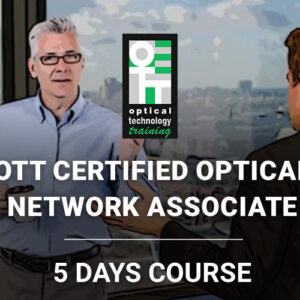Cable Network Technologies
Training Course
The Cable Network Technologies is a one-day network training course that offers professionals in the cable industry a comprehensive understanding of HFC networks and cable operator services. Designed for individuals from various departments without extensive technical backgrounds, this training provides insights into IP, fiber optics, wireless communication, internet and telephony services, multimedia delivery, digital television, and more. With virtual and in-person options, interactive sessions, and the ability to customize the training, it’s an ideal choice for anyone seeking to grasp the fundamentals of cable networks.
Description
The Cable Network Technologies Course is an essential network training course designed to provide professionals in the cable industry with a comprehensive understanding of HFC networks and the services offered by cable operators. Whether you’re a marketing expert, finance professional, project manager, or simply starting in the telecom field, this training is tailored to meet your needs without overwhelming you with technical details.
COURSE FEATURES:
- Virtual or in-person training options: Attend the course online or join us at Excentis for an immersive learning experience.
- Highly interactive sessions: Engage in discussions, ask questions, and gain practical insights through ample Q&A time.
- Customizable training: We offer predefined training modules or can tailor the course to address your specific requirements.
- One-day duration: Benefit from a concentrated and focused learning experience, saving you time and resources.
- Broad target audience: This training is suitable for professionals from various departments within the cable industry, ensuring that everyone gains a foundational understanding of cable networks.
WHAT DO YOU LEARN IN CABLE NETWORK TECHNOLOGIES TRAINING COURSE?
- Basic operation of HFC networks: Gain a clear understanding of how HFC networks function and the elements involved.
- Insights into IP and its future: Explore the world of Internet Protocol (IP), including IPv4, IPv6, IP QoS, multicast, DNS, OTT, and net neutrality.
- Fiber optics in operator networks: Learn about the usage and integration of fiber optics in HFC networks and backbone infrastructure.
- Wireless communication fundamentals: Acquire knowledge about wireless links, antennas, duplexing modes, interference, and LTE technology.
- Internet and telephony services: Understand how internet and telephony services are provided over an HFC network.
- Multimedia and digital television delivery: Discover the methods behind providing multimedia services and delivering television signals over an HFC network.
- Additional services and technologies: Get insights into Wi-Fi communities, cloud services, power-line communication, and more
COURSE INFORMATION:
PREREQUISITES: There are no specific prerequisites for this course.
METHODOLOGY: Instructor-led course, slides and notes on a digital platform with interactive quizzes and support afterwards
COURSE DURATION: 1-day training / Dates Mutually agreed
COURSE OVERVIEW:
- Introduction to the operator’s network, access network, backbone, and services.
- In-depth exploration of Internet Protocol (IP), covering IPv4, IPv6, IP QoS, multicast, DNS, OTT, and net neutrality.
- Understanding optical networking, including WDM/CWDM/DWDM, fiber usage in HFC networks and backbone, Sonet/SDH, and Ethernet.
- Insight into wireless communication, encompassing spectrum, wireless link, antennas, duplexing modes, interference, and LTE.
- Comprehensive overview of EuroDOCSIS, its components, versions (1.0/1.1/2.0/3.0/3.1/4.0), and a comparison with DOCSIS.
- Exploration of Voice over IP (VoIP), POTS, PSTN interface, security, lawful intercept, and more.
- Analysis of (Euro)PacketCable Multimedia goals, architecture, components, and real-life examples.
- Understanding digital cable television, including TV signal, compression, digital transport, conditional access, middleware, services, switched broadcasting, and TV over IP.
- Overview of additional services such as Wi-Fi communities, cloud services, and power-line communication.







